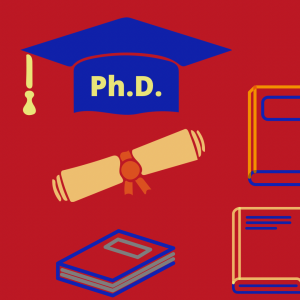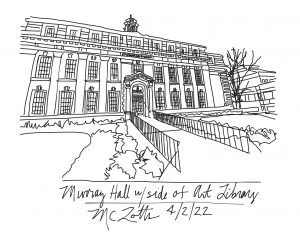 [This is Part 2 of our three-part series Reflections on a PhD in Literature. Read Part 1: The Basics] and Part 3: Reading for fun].
[This is Part 2 of our three-part series Reflections on a PhD in Literature. Read Part 1: The Basics] and Part 3: Reading for fun].
Now that I’ve explained the structure of a PhD in literature (and more or less, I think, other PhD programs in the humanities and social sciences), I want to talk a little bit about what it’s like to complete one. I had one of the better graduate school experiences among people I know, so don’t take these comments as wholly representative––others have had much bigger challenges, particularly if they had a bad advisor or bad relationship with their advisor (advisors have enormous responsibility for and wield enormous power over their advisees; I’m eternally grateful that mine was generous with her advice and feedback and didn’t play mind games with me, because an indifferent or manipulative advisor is the surest way to ruin one’s PhD experience!).
Even still, under the best of circumstances, being in a doctoral program––and particularly writing a dissertation––is tremendously stressful. It’s a highly self-directed process; your advisor will check in on your progress (at least a good one will), but day in and day out, you are setting your own agenda. That’s both liberating and terrifying. Not only do you have to set and keep a sustainable pace, you also decide what you’ll be working on. To my understanding this is less true for science PhDs, who work in a supervisor’s lab while carving out their own research agenda nestled within it. But what both have in common is that despite the appearance, and the title, of being a student, getting a PhD in any discipline actually becomes a lot more like work, whether that’s as a junior partner (the sciences model) or as a lightly mentored freelancer (the humanities model).
I’ve heard academia compared to the medieval guild model––apprentice, journeyman, and master––and there’s some real truth to that; the progression from learning to working isn’t a sudden forcible ejection but rather a gradual process of loosening supervision and greater autonomy. That means that at each stage of the process, you’re learning by doing, and so mistakes are inevitable but also part of the point. In the qualifying exams process, for instance, I was responsible for curating the lists of books I needed to read to become an expert in my field. I often joke that the main thing I learned from this process was how I would have done it differently if I could start over: by the end I knew which books I should have included and which I should have left off, how to take better notes than I had been taking on the first few items (about which I remembered next to nothing come exam time), and so on. But of course, there was no ‘next time’ to get it right; it was on to writing the dissertation, and a whole new round of learning-by-doing.
 Practically everyone who goes for a PhD gets there by being, at least in some sense or at some previous point, good at school: good at acquiring and synthesizing knowledge, good at progressing quickly through a curriculum, good at figuring out what was being asked of them at any given moment and producing it. A doctoral program relies on those skills, but it also demands others: the originality to articulate questions for yourself, rather than answer someone else’s; the initiative to set your own tasks; the vision to formulate and execute a long-term, multi-part project; and the resilience to get past setbacks and keep moving, even when it feels like groping in the dark for a lightswitch.
Practically everyone who goes for a PhD gets there by being, at least in some sense or at some previous point, good at school: good at acquiring and synthesizing knowledge, good at progressing quickly through a curriculum, good at figuring out what was being asked of them at any given moment and producing it. A doctoral program relies on those skills, but it also demands others: the originality to articulate questions for yourself, rather than answer someone else’s; the initiative to set your own tasks; the vision to formulate and execute a long-term, multi-part project; and the resilience to get past setbacks and keep moving, even when it feels like groping in the dark for a lightswitch.
The other way that people get into literature PhDs in particular, in addition to being good at school, is a love of reading. There’s a curious kind of tension involved in trying to make a career out of one of your favorite leisure pursuits. The conventional wisdom is that either you wind up with a job that feels like a hobby (“do what you love, and you’ll never work a day in your life,” as some jerk once claimed), or a hobby that feels like a job (I love the idiom “a busman’s holiday,” when your leisure time depressingly resembles your work––like a bus driver traveling for vacation). The truth is, as usual, somewhere in between. Reading is a big part of being a doctoral student or an academic, though hardly the only part––often it’s a tempting way to procrastinate the more difficult tasks, like writing! But the reading one does for work isn’t quite the same as the reading one does for fun, and how similar they can be (and hence how happy you’ll be) really depends on what you enjoy about reading literature. A lot of what you’ll read in graduate school will be works of literary criticism and theory, and when you’re reading primary works yourself you’ll be reading them like a critic––trying to articulate how they work, the worldview behind them, and what they say about the society in which they were produced. If that sounds like it would kill the fun of reading, don’t go torture yourself through a lit PhD; if that sounds to you like it is the fun of reading, then get ready for about as much as you can handle.
Related links
- The Graduate Program of Literatures in English
- Department of English, Rutgers-New Brunswick
- Department of English and Communication, Rutgers-Camden
- MFA in Creative Writing (Camden)
- Department of English, Rutgers-Newark
- MFA in Creative Writing (Newark)
Stay tuned for Part 3: Reading for Fun (while working toward a PhD in literature)

Murray Hall on the College Ave Campus is the home of the Department of English at Rutgers-New Brunswick